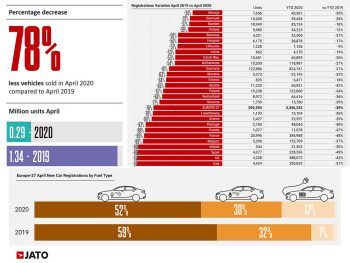EVs prevail in volatile European lockdown market
Electrified vehicles gain traction despite lockdown and a 78% year-on-year reduction in sales across Europe, notes JATO Dynamics, suggesting that OEMs that have invested in EV offerings are best placed to ride out the storm.
Volume fell from 1.34 million units in April 2019 to 292,600 vehicles in April 2020. This represents the lowest monthly level since the 1970’s, and the worst result among the big three markets – China, USA-Canada, and Europe.
Felipe Munoz, global analyst at JATO Dynamics commented: “The only silver-lining from this turbulence is that it has created an opportunity for automotive players to reassess their operations and become more agile.” As quarantine was not enforced across all countries, registrations fell at different times and different levels. For instance, in Scandinavia, citizens were granted more freedom of movement, thus registrations fell by 37%, the lowest decrease. In contrast, four of the top five markets saw significant declines following strict lockdown restrictions. Combined registrations in Italy, the UK, Spain and France tumbled from 646,000 units in April 2019 to 34,000 one year later.
However, electrified vehicle registrations totalled 50,400 units in April, making up 17% of the total market share. Demand still fell by 46% compared to April 2019, but this was mostly due to hybrid cars, which saw a decline of 66% to 18,900 units. Pure electric cars registered a decrease of 29% to 16,700 vehicles, while plug-in hybrids saw almost 14,000 new clients, up by 7%.
Munoz explained: “EVs were already driving part of the small growth that remained in 2019. This year, as governments have acted quickly to protect their people and economies, EVs have gained even more traction and visibility due to incentives.” Munoz continued: “These cars are likely to become the top choice for consumers seeking private transportation. OEMs who have invested heavily in EVs, are best placed to navigate the tough months ahead.”
Registrations of Volkswagen’s, Volvo’s, Audi’s and Ford’s EVs posted double-digit growth. They were able to gain traction arising from the Volkswagen Passat PHEV (981 units), up! BEV (678 units), Volvo V60 PHEV (897), XC40 PHEV (339 units); Audi e-tron (1,289 units), A3 e-tron PHEV (465); and Ford Puma HEV (1,170 units), Kuga PHEV (753). Other key models such as the Tesla Model 3, Renault Zoe and Nissan Leaf registered declines of 37%, 47% and 56% respectively – and contrary to UK SMMT sales figures putting the Tesla Model 3 at the top of the sales chart for April.
The global pandemic impacted the sales performance of 419 (out of 433) models that were available in both April 2019 and April 2020. Only 13 models saw an increase in registrations, among which were the electric Mercedes-Benz EQC (42 units to 409) and Audi e-tron (963 to 1,307), as well as the Porsche Cayenne Coupé (68 to 210), Skoda Scala (713 to 1,673), BMW X7 (202 to 341), Mercedes-Benz GLE (1,047 to 1,272), BMW X6 (405 to 471), and Mercedes-Benz GLS (174 to 195).
Among the top-selling models, were the Volkswagen Passat, BMW X3 (the top-selling premium car), and Volvo S60/V60 in 24th position. Top market share was awarded to the Skoda Kamiq, BMW X3, Skoda Octavia, Ford Puma and Mercedes-Benz GLC. In contrast, the Fiat Panda, Nissan Qashqai, Volkswagen Polo, Opel Mokka and Peugeot 3008 recorded the largest declines in market share.


